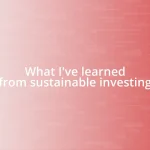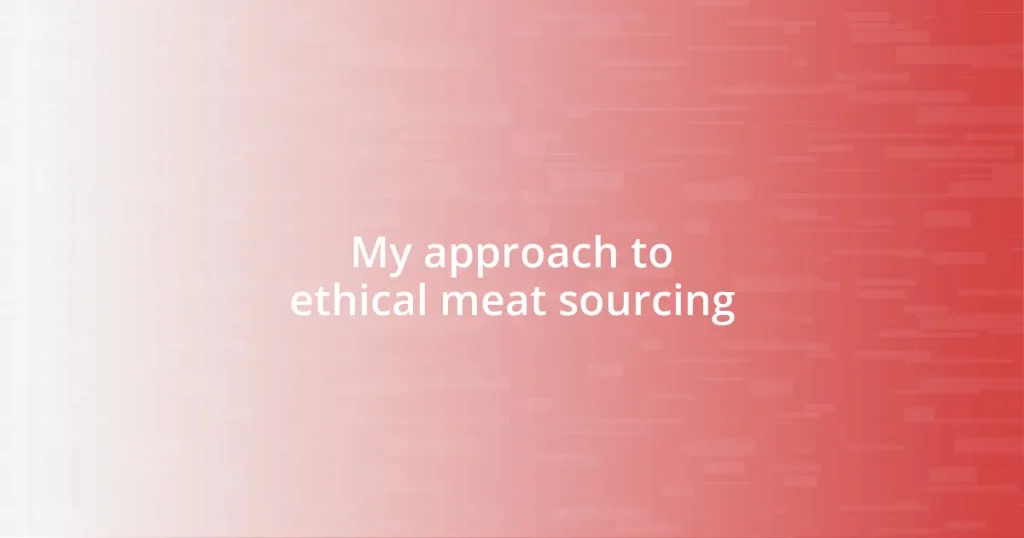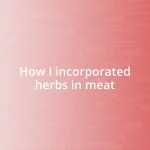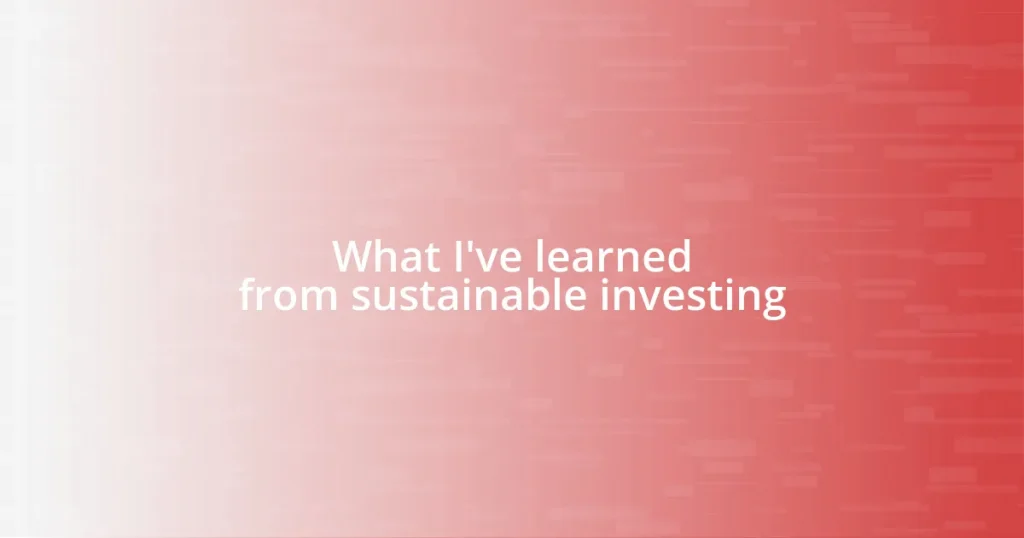Key takeaways:
- Ethical meat sourcing focuses on animal welfare, environmental impact, and transparency in farming practices.
- Building relationships with local farmers fosters trust and supports community economies through informed choices.
- Recognizing humane certifications helps consumers make ethical decisions and ensure animal welfare standards.
- Advocating for ethical practices can inspire positive change and raise awareness within communities and social circles.
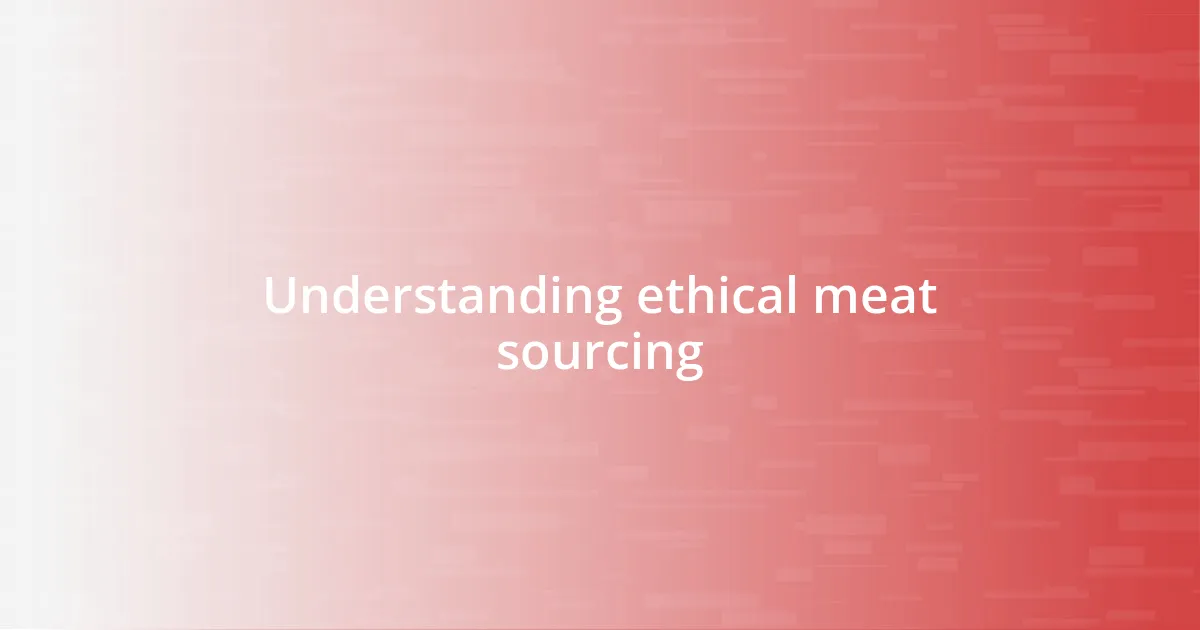
Understanding ethical meat sourcing
Understanding ethical meat sourcing is about recognizing the complex relationships between animals, farming practices, and our food choices. I remember visiting a local farm where the animals roamed freely; it was heartwarming to see them in a natural environment. How often do we stop to think about where our meat comes from and the lives our food has lived?
Ethical meat sourcing emphasizes transparency in the supply chain. It invites us to explore questions like: Are the animals treated with respect? Are they raised in humane conditions? When I choose to buy meat, I look for sources that prioritize animal welfare because that connection fosters a sense of responsibility and compassion for the beings we consume.
Moreover, ethical meat sourcing isn’t just about treating animals well; it’s about the environmental impact too. I once participated in a community discussion on sustainable farming, and I was struck by how interconnected our choices are. By supporting local farms that implement ethical and sustainable practices, we can nurture both our health and the planet’s health at the same time. Wouldn’t you agree that being intentional about our meat choices can lead to profound changes in our communities?
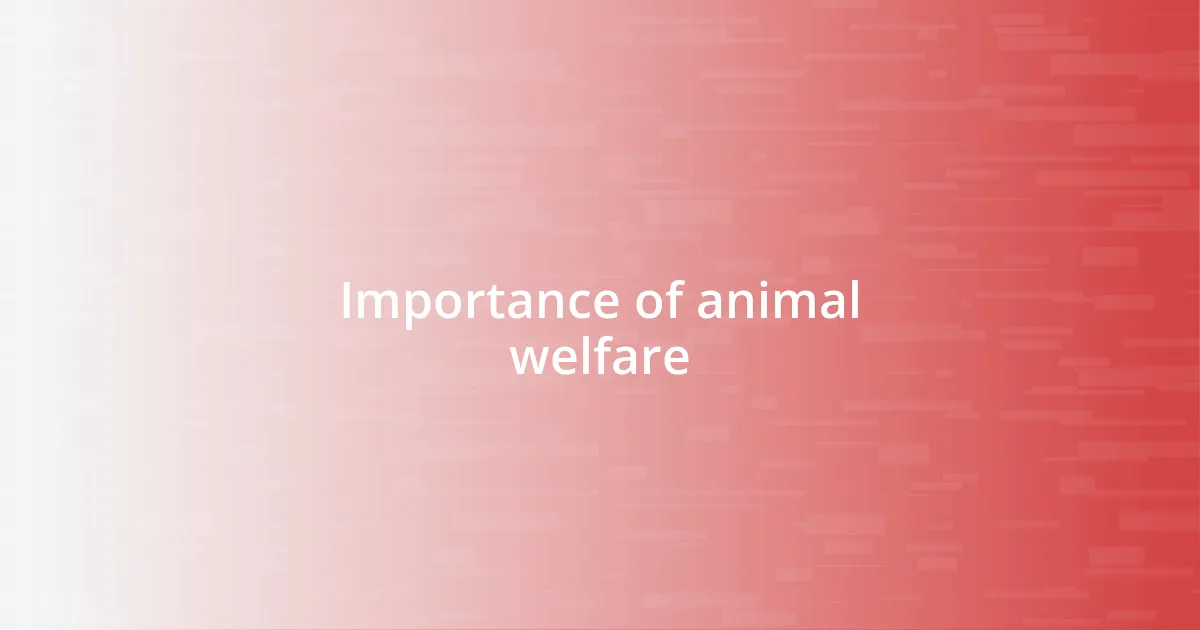
Importance of animal welfare
Animal welfare is crucial in our meat sourcing decisions. I recall my first experience volunteering at a rescue farm, and the sheer joy I felt watching animals receive love and care. Observing the differences in animal behavior when they are treated with kindness versus neglect was eye-opening. It’s not just about avoiding cruelty; it’s about recognizing the sentience of these beings. When we prioritize animal welfare, we contribute to a more humane and compassionate food system.
Further, research shows that when animals are raised in humane environments, the quality of the meat they produce improves significantly. I remember cooking a roast from a farm that prioritized animal welfare, and the flavor was outstanding—so much richer than what I had experienced before. This connection between how animals are treated and the quality of our food seems so clear to me. It’s a win-win situation where both the animals and consumers benefit.
In my experience, supporting farms that uphold high animal welfare standards not only leads to better food but also fosters a sense of community. Chatting with farmers who genuinely care for their animals creates connections that extend beyond the dinner table. Building relationships with these farms reminds us that our choices matter and encourages us to make more informed, ethical decisions in our daily lives.
| Aspect | Conventional Farming Practices | Ethical Farming Practices |
|---|---|---|
| Animal Living Conditions | Crowded and stressful environments | Spacious and natural habitats |
| Treatment of Animals | Often neglectful, avoiding humane standards | Humane treatment, respect for life |
| Meat Quality | Lower quality, inconsistent | Higher quality, better flavor |
| Environmental Impact | Often negative, contributes to pollution | Focus on sustainability and biodiversity |
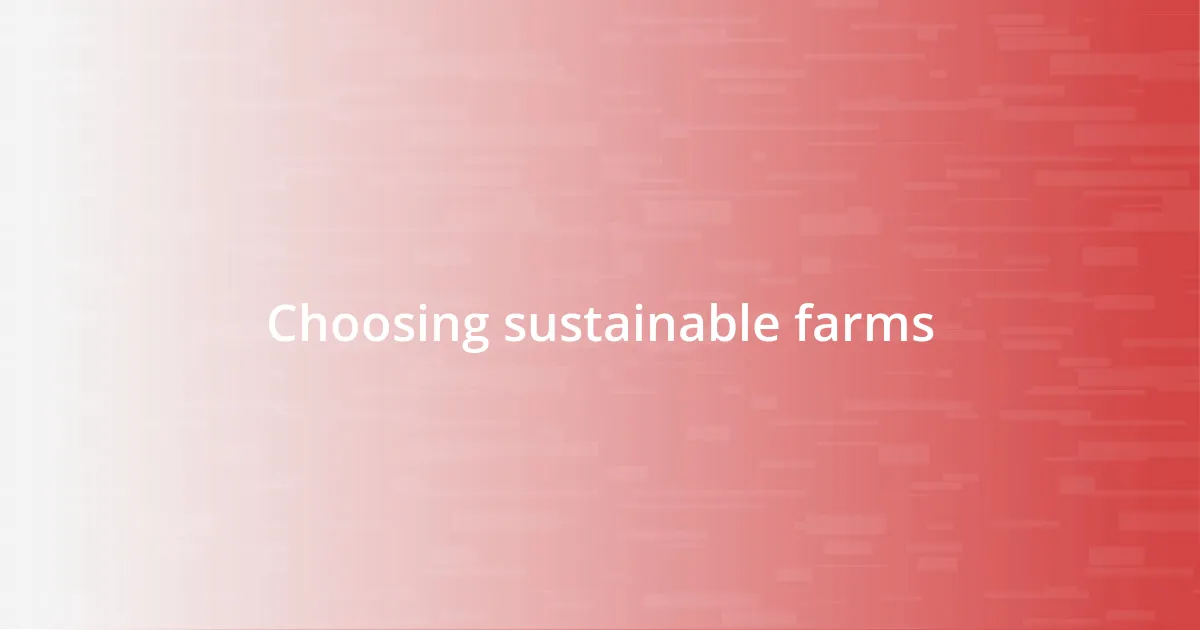
Choosing sustainable farms
Sourcing meat from sustainable farms is a choice that resonates with my values. I clearly remember standing in a field that was alive with vibrant greenery, where animals grazed peacefully under the sun. This imagery stands in stark contrast to the images of factory farming that often come to mind. Supporting sustainable farms not only promotes biodiversity but also assures that animals are treated humanely. It’s about fostering a relationship with our food—a relationship grounded in respect for the environment and the animals that inhabit it.
Here are some key factors I consider when choosing sustainable farms:
– Animal Welfare: Ensuring that animals are well cared for in spacious environments.
– Biodiversity Practices: Supporting farms that grow a variety of crops and raise different animals, promoting a healthier ecosystem.
– Community Engagement: Choosing farms that are involved with their local communities and invest in local economies.
– Environmental Responsibility: Prioritizing farms that use sustainable farming methods to minimize environmental impact.
– Transparency in Practices: Looking for farms that openly share their farming practices and how they treat their animals.
These elements make a tangible difference in the meat I consume and reflect my commitment to supporting farms that truly care about their practices. Every choice I make feels like a step towards a more responsible and compassionate food system.
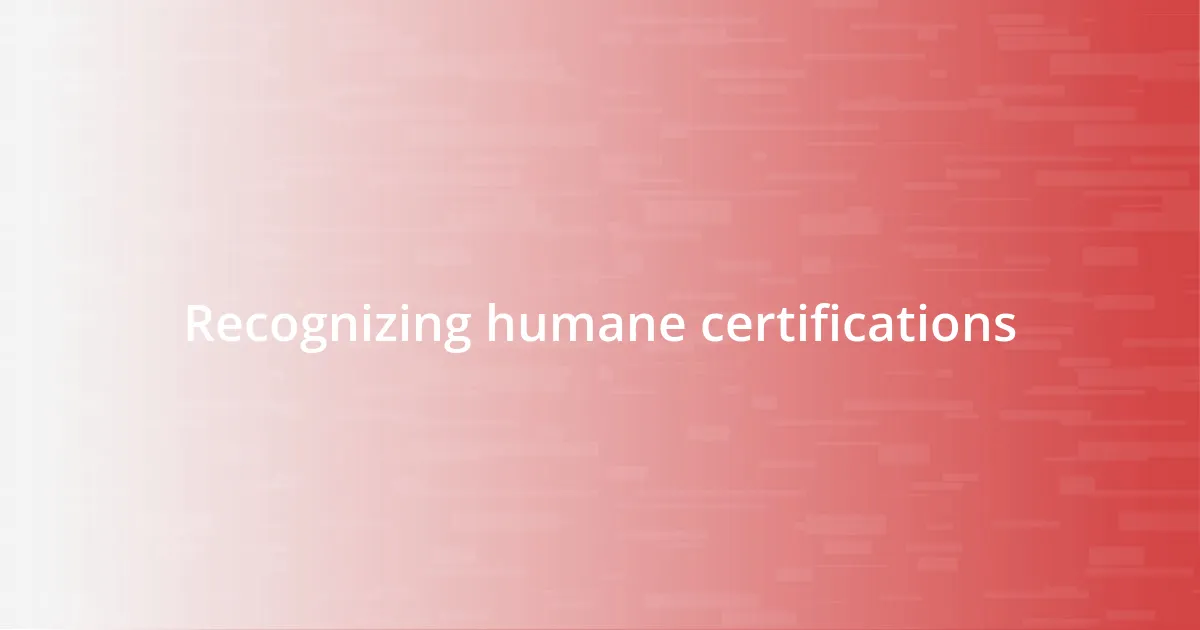
Recognizing humane certifications
Recognizing humane certifications is a vital aspect of my meat sourcing journey. I’ve often found myself standing in front of meat counters, scrutinizing labels for symbols that indicate animal welfare standards. Each time I spot a certification like Animal Welfare Approved or Certified Humane, it gives me a sense of relief and confidence, knowing that the meat I’m purchasing comes from farms that prioritize the well-being of their animals. It’s amazing how a simple label can transform my shopping experience.
There’s a world of difference between conventional practices and those that are certified humane. I recall a visit to a local farm that proudly displayed its humane certification. As I watched the animals frolicking freely, I couldn’t help but smile. It struck me that these certifications reflect not just standards, but a commitment to ethical farming that resonates deeply with my values. They act as a beacon, guiding consumers like me toward more compassionate choices in a crowded market.
So, how can we ensure that the certifications we trust are genuine? In my exploration, I’ve learned to research organizations behind the labels and understand their criteria. It feels empowering to know that I’m not just buying meat; I’m supporting a system that values animal welfare and ethical practices. When we connect with these certifications, we’re not just making choices; we’re shaping a food culture that respects and honors all living beings.
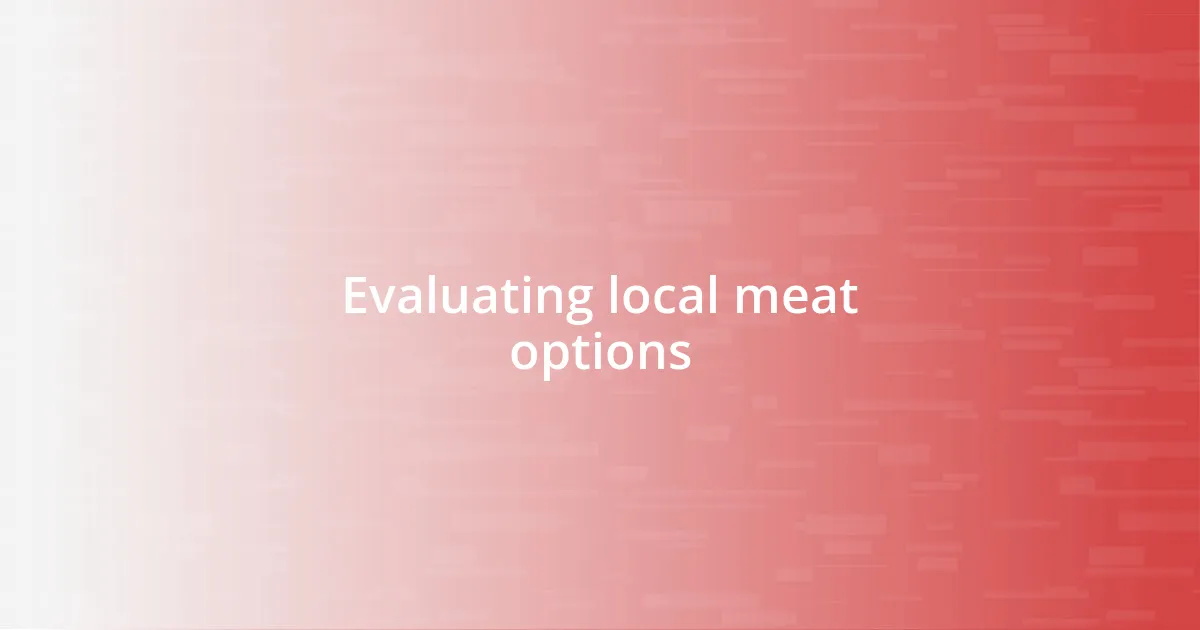
Evaluating local meat options
When I embark on evaluating local meat options, I often start by visiting farmers’ markets. There’s something so invigorating about chatting with local farmers, hearing their stories, and understanding their practices firsthand. I remember striking up a conversation with a farmer who raised free-range chickens, and she shared how happy and healthy her flock was. It’s moments like these that reveal not just the quality of meat but the passion behind the process.
I also pay attention to the conditions under which animals are raised. One time, I toured a farm that utilized rotational grazing—a method that ensures grasslands are protected and animals are healthier. As I walked through the fields, I was in awe of the idyllic setting, with animals roaming freely and the land flourishing. Witnessing such humane practices in action truly reinforced my commitment to choosing local options that respect both the animals and the environment.
Finally, I think about the community impact of my choices. When I purchase meat from local sources, I’m not just feeding my family; I’m supporting my neighbors’ livelihoods. A few months ago, I saw firsthand the ripple effect of this support during a community gathering. Local farmers shared their successes and challenges, helping me appreciate how my choices directly contribute to a thriving local economy. Isn’t it empowering to realize that each bite can reflect not just personal values, but also a commitment to uplifting our community?
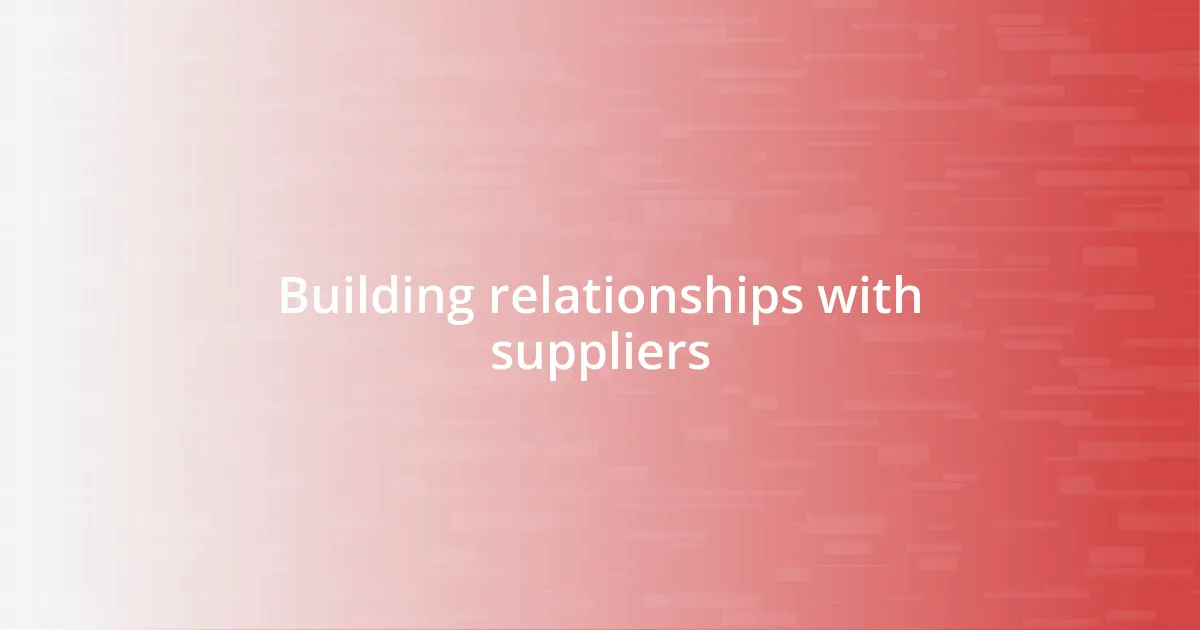
Building relationships with suppliers
Building strong relationships with suppliers has been one of the most enlightening aspects of my meat sourcing journey. I recall a time when I took the initiative to visit a sustainable farm, eager to meet the people behind the products I valued. As I walked the property and interacted with the farmers, their passion and dedication were palpable. It made me realize that these relationships aren’t just transactional; they’re built on trust and mutual respect.
Engaging suppliers in genuine conversations about their practices can be eye-opening. I remember asking a rancher about his animal husbandry techniques, and he opened up about his commitment to holistic grazing practices. His enthusiasm was infectious! It dawned on me that understanding their stories not only enriches my knowledge but also fosters a partnership that can drive ethical sourcing decisions. How often do we consider the human element behind our food?
A lasting relationship with suppliers also empowers both sides to innovate for better sustainability. For instance, I’ve collaborated with local producers to explore new ways of minimizing waste in meat processing. This collaboration not only benefits me as a consumer but also encourages suppliers to adopt more sustainable methods. When we work together toward ethical goals, it creates a community of like-minded individuals striving for positive change. Isn’t it inspiring to think about the potential impact of these connections?

Advocating for ethical practices
Advocating for ethical practices means elevating the conversation around how we source meat, and I genuinely believe it’s essential to speak up for better standards. Recently, I came across an online campaign that highlighted the significance of humane treatment and environmental stewardship in animal agriculture. Reading the stories of how ethical practices transformed local farms truly moved me. It made me wonder: how often do we support initiatives that not only prioritize animal welfare but also encourage sustainable practices that benefit our planet?
In my experience, one of the best ways to advocate for ethical practices is to share these stories within my own circles. I recall hosting a dinner party where I served responsibly sourced meat and took the opportunity to discuss the farmers’ commitment to ethical practices. It was rewarding to see my friends’ concerned expressions turn into enthusiasm as they learned about the positive impacts of their food choices. Do our dining experiences not have the power to inspire change among those we care about?
Moreover, I’ve found that being vocal about my ethical sourcing journey on social media can spark meaningful conversations. One time, I posted a short video highlighting a local farm’s practices that promote animal welfare, and the feedback was incredible. People reached out to share their experiences and questions, creating a supportive community focused on ethical meat sourcing. This made me reflect on one simple question: if we’re not sharing our journeys, how will we inspire others to champion ethical practices?
